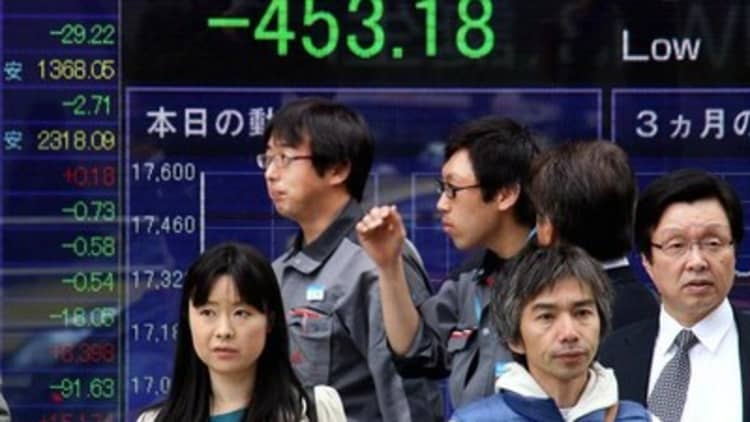Latest minutes from the Bank of Japan (BOJ) released Tuesday reveal that the central bank's surprise move in October to expand its already-massive stimulus program was about sending the message that it will do whatever it takes to "conquer deflation."
"The BOJ intended to send a strong message, beyond the financial markets, to jolt the wider economy," said Shun Maruyama, Chief Japan Equity Strategist at BNP Paribas. "Consumer and business leaders remain unmoved by monetary policy."
Consumer inflation looks set to stall at around 1 percent, half of the BOJ's stated target, he added, noting capital investments are picking up but not by enough to boost economic growth.
Read More BoJ bazooka to spark currency war
The BOJ's commitment to pull the country out of two decades of deflation remains "unshakable", according to the minutes from its policy meeting on October 31, when the central bank expanded its asset purchase program by 30 trillion yen to 80 trillion yen.
"If no policy action was taken at this meeting, this could be understood as a breach of the commitment (to achieve its inflation target of 2 percent), thereby possibly impairing the Bank's credibility significantly," said one board member.

The members that supported further monetary easing argued that the BOJ needed to "convey the bank's unwavering resolve to conquer deflation." In a tight ballot, five members backed the latest measures, and four voted against.
Inflation target
The BOJ kept its goal to boost the inflation rate to 2 percent by next year, but falling oil prices could put the target in question.
When stripped of the effect of April's consumption tax hike, Japan's core inflation rate rose 1 percent in September from the year-ago period, its lowest pace in nearly a year.
Read MoreBOJ's Kuroda vows to hit price goal, stands ready to do more
"The year-on-year rate of increase in the CPI (all items less fresh food) was likely to be at around 1 percent for some time, mainly due to the effects of the decline in crude oil prices," board members said.
"On the condition that crude oil prices stayed at around the current level, the downward pressure on inflation rates on a year-on-year basis would remain until around the first half of fiscal 2015," they added.
According to Nobuhiko Kuramochi, strategist at Mizuho Securities, the BOJ "needed to do something" as minutes hint that board members are concerned inflation will fall below 1 percent by next April.
For Noguchi, Daiwa's BOJ watcher, the most interesting point is that "the minutes revealed for the first time the reasons why some BOJ board members oppose additional monetary easing," she said.
Read MoreBank of Japan battles entrenched 'deflation mindset'
These board members, whom she says "all have business and financial markets backgrounds," specifically warned of the consequences of increasing Japanese Government Bond (JGB) purchases by 80 trillion yen.
"This would mean the bank was purchasing most of the JGBs issued on a flow basis," one of the board members states in the minutes. "Not only would this considerably squeeze liquidity in the JGB market, but it also would further heighten the risk that such a move would be perceived as effectively financing fiscal deficits."

